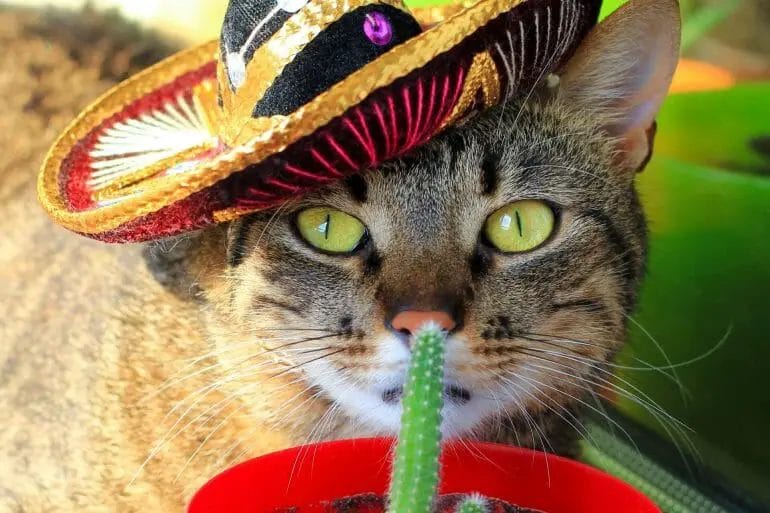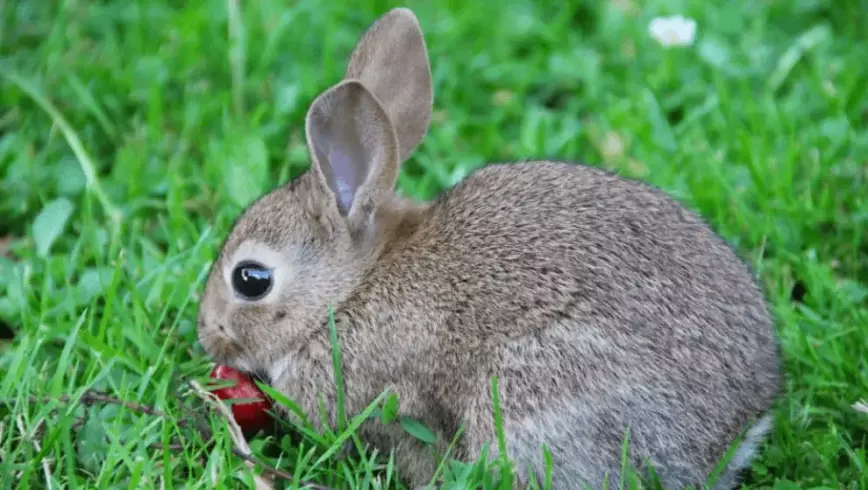Are you wondering if bunnies can eat tortillas?
While bunnies enjoy a varied diet, it’s important to note that tortillas are not an ideal food for them. Bunnies have delicate digestive systems that thrive on a diet rich in hay, fresh vegetables, and a small amount of pellets. Tortillas, on the other hand, can be difficult for bunnies to digest and may cause digestive issues or weight gain.
It’s best to stick to bunny-friendly foods to ensure their health and well-being.

Risks and Precautions of Feeding Tortillas to Bunnies
In this section, we will explore the risks associated with feeding tortillas to bunnies and the precautions that should be taken to ensure their well-being.
Potential Risks
Although tortillas may seem harmless, they can pose several risks to the health of bunnies. It’s crucial to be aware of these risks before introducing any new food into their diet:
- High Carbohydrate Content: Tortillas are primarily made of refined flour, which is high in carbohydrates. Bunnies have a sensitive digestive system that is not designed to handle large amounts of carbohydrates. Feeding tortillas can lead to digestive upset, such as bloating and diarrhea.
- Low Nutritional Value: Tortillas lack essential nutrients that bunnies need to thrive, such as fiber and vitamins. Feeding them as a regular part of their diet can result in malnutrition and other health issues.
- Possible Choking Hazard: Tortillas are typically soft and pliable, but they can become sticky when chewed. This increases the risk of the tortilla getting stuck in the bunny’s throat, causing choking.
- Allergic Reactions: Some bunnies may be allergic to certain ingredients found in tortillas, such as wheat or corn. Feeding them tortillas can trigger allergic reactions, including skin irritation and gastrointestinal distress.
Precautions to Take
While it’s best to avoid feeding tortillas to bunnies altogether, if you still choose to offer them as an occasional treat, it’s important to take the following precautions:
- Small Portions: Limit the serving size to a small piece, no larger than the size of your bunny’s paw. This helps prevent overconsumption and reduces the risk of digestive issues.
- Choose Whole Wheat: If you decide to feed tortillas to your bunny, opt for whole wheat tortillas instead of those made with refined flour. Whole wheat tortillas contain more fiber, which is beneficial for their digestive health.
- No Added Ingredients: Avoid tortillas that have added ingredients, such as salt, seasonings, or oils. These additives can be harmful to bunnies and may cause adverse reactions.
- Monitor for Allergic Reactions: Introduce tortillas gradually and observe your bunny for any signs of allergic reactions. If you notice any unusual symptoms, such as itching, sneezing, or gastrointestinal distress, discontinue feeding tortillas immediately.
- Consult with a Veterinarian: If you have concerns about adding tortillas or any other human food to your bunny’s diet, it’s always best to consult with a rabbit-savvy veterinarian who can provide personalized advice based on your bunny’s specific needs.
While tortillas may be a delicious treat for humans, they are not suitable for regular consumption by bunnies. The high carbohydrate content, lack of essential nutrients, and potential risks associated with tortillas make them a less-than-ideal choice for our furry friends. It is essential to prioritize their health and well-being by providing them with a balanced diet consisting of fresh hay, leafy greens, and rabbit-specific pellets.

Alternative Diet Options for Bunnies Instead of Tortillas
Feeding your bunny a balanced and nutritious diet is essential for their overall health and well-being. While tortillas may seem like a convenient option for a quick snack, they are not suitable for bunnies and can cause digestive issues. Thankfully, there are plenty of alternative diet options that are safe and beneficial for your furry friend.
1. Hay
Hay is the most important part of a bunny’s diet and should make up the majority of their food intake. It provides essential fiber, which is vital for their digestive system.
Fresh Timothy, Orchard, or Meadow hay are excellent choices for bunnies. Ensure that the hay is free from dust, mold, and excessive moisture.
Introduce hay to your bunny gradually and make sure it is always available to them.
2. Fresh Vegetables
Offer a variety of fresh vegetables to your bunny to provide them with essential vitamins and minerals. Leafy greens such as kale, spinach, and romaine lettuce are excellent options.
You can also include herbs like parsley and cilantro. Remember to introduce new vegetables slowly to avoid any digestive upsets and only feed them in small quantities.
Avoid feeding bunnies vegetables high in sugar or starch, such as carrots or potatoes.
3. Pellets
Rabbit pellets are commercially available and can be a convenient option for providing essential nutrients.
Look for high-quality pellets specifically formulated for rabbits. Avoid ones that contain added sugars, artificial colors, or fillers.
Pellets should only make up a small portion of your bunny’s diet and should be fed in moderation.
4. Fresh Fruits
While fruits can be a tasty treat for bunnies, they should only be given in moderation due to their high sugar content.
Suitable options include small portions of berries, apple slices, or melon. Remove any seeds or pits before feeding fruits to your bunny.
Remember, treats should be given sparingly and should not exceed more than 10% of their daily food intake.
5. Water
Providing fresh water to your bunny is crucial for their overall health. Ensure that they always have access to clean, fresh water in a water bottle or bowl.
Change the water daily to prevent contamination and encourage proper hydration.
6. Avoid Certain Foods
There are some foods that should be strictly avoided as they can be toxic to bunnies. These include chocolate, caffeine, onions, garlic, and avocados.
Additionally, any processed or sugary foods should be avoided as they can cause digestive issues and lead to obesity.

How to Introduce Tortillas to a Bunny’s Diet Safely
While hay and fresh vegetables should make up the majority of rabbit’s food intake, you may be wondering if it’s safe to introduce tortillas into their diet. In this section, we will explore how to safely introduce tortillas to a bunny’s diet.
1. Start with Small Portions
Before adding tortillas to your bunny’s diet, it’s essential to start with small portions. Begin by offering a small piece of tortilla as a treat to see if your bunny enjoys it and tolerates it well.
Monitor their reaction closely to ensure they don’t display any signs of discomfort or adverse effects.
2. Choose the Right Type of Tortilla
Not all tortillas are created equal, and the type you choose can make a difference in your bunny’s health.
Opt for whole wheat or corn tortillas instead of those made with white flour. Whole wheat and corn tortillas are healthier options as they are higher in fiber and provide more nutrients for your bunny.
3. Ensure Tortillas Are Plain
When offering tortillas to your bunny, make sure they are plain and contain no added flavors, seasonings, or ingredients.
Avoid tortillas with excessive additives, such as salt, spices, or artificial flavorings. These can be harmful to your bunny’s delicate digestive system.
4. Gradually Increase the Amount
If your bunny tolerates tortillas well and enjoys them, you can gradually increase the amount you offer.
However, keep in mind that tortillas should still be a small part of their overall diet. The main focus should remain on hay and fresh vegetables, which provide essential fiber and nutrients for your bunny’s well-being.
5. Monitor Your Bunny’s Health
Throughout the introduction of tortillas to your bunny’s diet, it’s crucial to monitor their health and behavior.
Keep an eye out for any signs of digestive upset, such as diarrhea, bloating, or loss of appetite. If you notice any concerning symptoms, discontinue feeding tortillas and consult a veterinarian.
6. Variety is Key
Remember that tortillas should not be the only treat you offer your bunny. It’s important to provide a variety of treats and rotate them to ensure a well-rounded diet.
Consider offering other safe options such as small pieces of fruits, fresh herbs, or bunny-safe vegetables to keep your bunny happy and healthy.
7. Consult with a Veterinarian
If you have any concerns about adding tortillas to your bunny’s diet or want professional guidance, it’s advisable to consult with a veterinarian who specializes in exotic pets. They can provide personalized recommendations based on your bunny’s specific needs and health conditions.
Are tortillas safe for bunnies?
Plain, unsalted tortillas made from simple ingredients like flour, water, and salt in moderation are generally safe for bunnies. However, it’s essential to avoid giving them tortillas with fillings or toppings that may be harmful to their health, such as cheese, meats, or spicy sauces. Always consult with a veterinarian before introducing any new food into your bunny’s diet.
Can bunnies have tortillas as a part of their regular diet?
No, tortillas should not be a staple in a bunny’s regular diet. Bunnies require a balanced diet that consists mainly of hay, fresh vegetables, and quality pellets. Tortillas lack the necessary nutrients that bunnies need to stay healthy, so it’s best to stick to bunny-specific foods for their main meals.
Are corn or flour tortillas better for bunnies?
Both corn and flour tortillas can be given to bunnies in small amounts, as long as they are plain, unsalted, and free from any harmful additives. However, flour tortillas may be a slightly better option because they are easier for bunnies to digest compared to corn tortillas. Always monitor your bunny’s reaction after consuming any new food and adjust their diet accordingly.
What are some safe treats for bunnies?
There are plenty of safe and healthy treats that bunnies can enjoy in moderation. Some examples include fresh fruits like apples and berries, leafy greens such as kale and spinach, and small quantities of carrots or celery. Always introduce new treats gradually and monitor your bunny for any adverse reactions.
Can tortillas be used as bedding for bunnies?
No, tortillas should never be used as bedding material for bunnies. They can pose a choking hazard and lead to digestive issues if ingested. It’s best to provide your bunny with appropriate bedding materials such as hay, straw, or specialized bedding made for small animals.
How can I ensure my bunny’s diet is balanced?
Ensuring a balanced diet for your bunny is essential for their overall health. The majority of their diet should consist of fresh hay, which provides essential fiber and aids in digestion. Alongside hay, offer a variety of fresh vegetables, such as dark leafy greens and a small portion of quality pellets formulated specifically for rabbits. Consult with a veterinarian for specific dietary recommendations based on your bunny’s age, breed, and health condition.
Can bunnies have tortillas if they have dietary restrictions?
If your bunny has dietary restrictions or health issues, it’s crucial to consult with a veterinarian before introducing any new food, including tortillas. Some bunnies may have specific dietary needs or sensitivities that require a specialized diet. In such cases, it’s best to follow your vet’s advice and avoid foods that may potentially harm your bunny’s health.
Final Thought
Bunnies should not eat tortillas as a part of their regular diet. While small amounts of tortilla might not be harmful, it is not a nutritionally balanced food for rabbits.
Bunnies require a diet rich in hay, fresh vegetables, and a limited amount of pellets. Tortillas are high in carbohydrates and may cause digestive issues in rabbits. It’s important to provide your furry friend with a well-rounded diet to ensure their overall health and well-being.
Instead of tortillas, consider offering your bunny a variety of safe and rabbit-friendly treats, such as fresh fruits like apples or leafy greens like cilantro.
Remember to consult with a veterinarian to determine the best diet and portion sizes for your specific bunny’s needs. By providing proper nutrition, you can keep your bunny happy, healthy, and full of energy.
